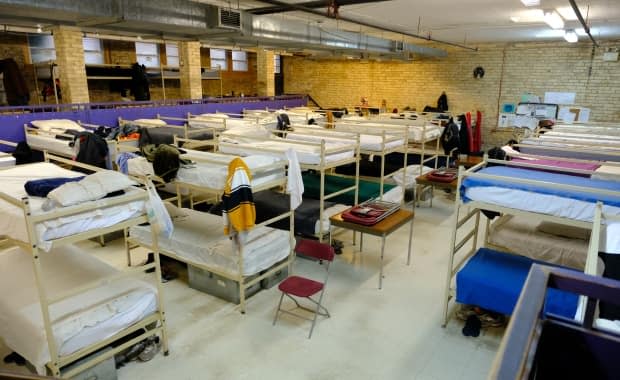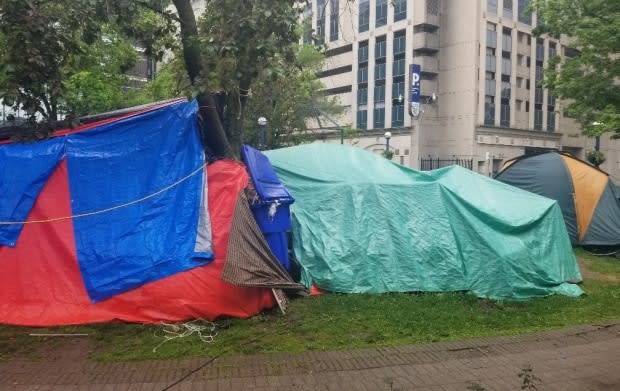Homeless advocates head to court in fight with city over physical distancing in shelters
Housing advocates in Toronto are taking the city to court again on Thursday because they allege that the city misled them about physical distancing in its homeless shelter system.
A coalition of groups says the city claimed on June 15 that it had ensured there was physical distancing in its homeless shelters even though officials knew that the city was not in compliance with a settlement agreement it reached with the coalition on May 15.
Under that settlement agreement, the city had agreed to ensure its shelters meet physical distancing standards to protect clients during the COVID-19 pandemic.
In its written legal argument, the coalition uses emails and other documents it obtained through the court process to assert that senior managers at the city's Shelter, Support and Housing Administration (SSHA) knew on June 15 that the city was not complying with its obligations under the agreement.
The city disputes the allegations, which have not been proved in court, saying it has worked tirelessly to follow the rules and has found homes or temporary residences for thousands who use the shelter system.
"City staff have been working toward the goal of achieving physical distancing within the shelter system since March. The commitments in the Agreement are the same objectives that the City was already working to achieve well before these proceedings began," the city says in a written legal argument.
"The City has moved 2,300 beds and assessed over 100 sites for physical distancing compliance, all the while continuing to deliver its core services and programming to clients experiencing homelessness," the argument continues.
Case to be heard online on Thursday
The case, launched by Sanctuary Ministries of Toronto, Aboriginal Legal Services, the Advocacy Centre for Tenants Ontario, the Black Legal Action Centre, the Canadian Civil Liberties Association, the HIV & AIDS Legal Clinic Ontario, is scheduled to be heard online at the Ontario Superior Court of Justice.
Doug Johnson Hatlem, street pastor with Sanctuary Ministries of Toronto, alleged in an interview with CBC Toronto on Monday that the city has not been forthright about physical distancing in shelters.
"I've been working at issues around housing with the city for over a decade and I'm still quite shocked that they would put forward such false information in a court process," Hatlem said.
"It's really unfortunate that in six months the city still hasn't ensured that there is two metres distance in all directions in its shelter system, leaving vulnerable people exposed to a deadly disease."

On June 15, the city told the coalition that it had achieved 100 per cent compliance with physical distancing requirements across its shelter system.
However, according to Hatlem, there has been a "lack of candour" on the part of the city and it has breached its legal obligations.
The coalition is calling on the court to find that the city has not acted in good faith, to issue an order stating that the agreement continues to be in force until compliance with physical distancing standards is achieved across all of its shelters and to appoint a monitor to oversee the city's compliance with the settlement agreement.
For its part, the city argues against a monitor overseeing its compliance, calling such a remedy "extraordinary."
City takes offence at allegations of a coverup
The city says the coalition, in its legal action, is challenging the competence and integrity of the city's SSHA staff.
"These assertions are an insult to the City as an organization, that at its peak, redeployed over 400 City employees to work in the shelter sector and is spending millions per week of unfunded or unbudgeted money to continue its COVID-19 response in the shelter sector; they are insulting to SSHA senior management staff, who had the enormous task of coordinating an unprecedented response to a novel public health crisis,; and they are insulting to the hundreds of front-line staff, who have worked through new challenges and uncertainty in delivering essential services," the city says.
The city is also taking offence to allegations that it has misled the advocates, calling allegations of a coverup "preposterous" and "offensive."
Court fight stems from legal action in late April
The coalition originally brought a legal action in late April seeking an injunction to force the city's 75 shelters to follow physical distancing rules.
According to the coalition, evidence from the city's own records shows that the city failed to provide accurate information about what was happening in its shelters, as required under the terms of the settlement agreement.
In a news release on Monday, the coalition said it will argue that the city has not met its legal obligations under the settlement agreement as of June 15 and that a substantial number of shelters have never achieved the two-metre distancing standard to which the city agreed. The standard is based on recommendations from public health officials to slow the spread of COVID-19.
Justice Lorne Sossin of the Ontario Superior Court is expected to hear the case.

Jessica Orkin, co-counsel for the coalition, said in the news release that the city has not been upfront with the coalition.
"The evidence shows that as of June 15, on the same day that the city asserted that it had achieved full compliance with the two-metre physical distancing requirements, multiple city managers were aware that this had, in fact, not been achieved for a substantial number of sites across the shelter system." she said.
"Unfortunately, this conduct reveals a troubling pattern of disregard for the truth."
City agreed to use best efforts to achieve distancing
The settlement agreement, reached after the legal action in late April, applies to all shelters, respites, drop-ins and former hotels turned into shelters that are operated or funded by the city.
Under the terms of the agreement, the city agreed to meet certain commitments about shelter system conditions.
In particular, the city agreed to use its best efforts to achieve and sustain two metres of distance between all shelter beds, to end the use of bunk beds, and to provide a bed for anyone who had used the shelter system since March 11, even if he or she was forced to leave for any reason.
The city also agreed to report regularly to the coalition about its efforts to achieve physical distancing in shelters and to answer questions about those reports.


